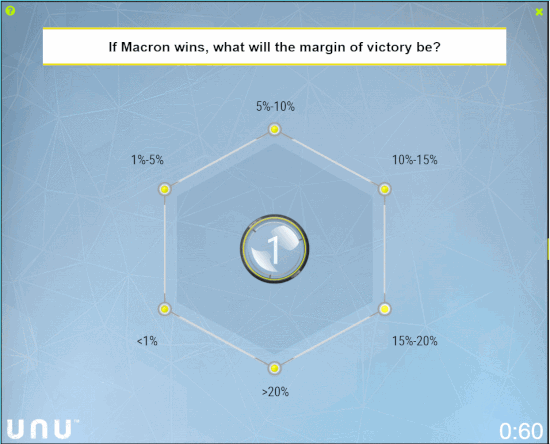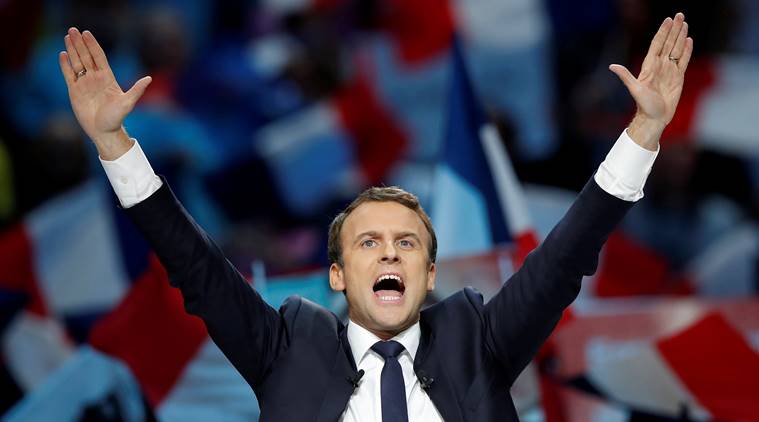Our earlier report on the French Presidential Elections 2017 showed that Unanimous A.I.’s collective intelligence “swarm” had predicted a win for Emmanuel Macron. That prediction has come true, and Macron will be the next President of France, taking office on Sunday.
One of the outcomes predicted by the AI swarm was a 15 percent margin of victory. Macron won by a much wider margin than that – 66 percent against Le Pen’s 34 percent – a margin of 32 percent, or more than twice what the UNU prediction showed.
Is there a reason for that large difference?
The populist wave in France leading up to the elections showed a distinct possibility of an upset victory for Le Pen, and this is something we discussed in the previous article.
Link to Article: Swarm Artificial Intelligence Predicts Macron to Win French Presidential Elections 2017
If the French Presidential Elections had, in fact, played out that way, it would have validated Trump making it to the White House, in a sense. It would have also indicated that there is a “nativist movement sweeping the Western world,” as pointed out by the BBC’s Anthony Zurcher.
The fact that it did not play out in favor of Le Pen, therefore, cannot be a good sign for Trump. But we’re not getting into the political implications of Macron’s win.
Even though the swarm’s prediction was not accurate on the margin front, I don’t necessarily see that as a weakness on the part of Unanimous A.I.’s swarm AI methodology or the UNU platform’s complex algorithms.
The group that made up the swarm was very clearly unaware of how deep the French people’s collective sentiment tended to lean toward a new government over a far-right, traditional one.
At one point, the consensus (the puck indicating the swarm’s ‘decision-in-progress’ while the swarm is being run) did appear to move towards the >20% margin option, but it shifted partway and headed, almost hesitatingly, towards 15-20 percent. A subsequent swarm run showed a distinct preference for the 15 percent option, as you can see below.

The question now is: Was the swarm playing it safe? Did the swarm members’ intuition first guide them to an outcome with a wider margin before the collective intelligence of the swarm led them to a more cautious consensus?
I asked Unanimous A.I.’s founder, Louis Rosenberg, about this, and here’s what he had to say:
“I think the conservative margin has to do more with the timing of the prediction than anything else.
We ran the swarm just after the news was breaking about the hack of Macron, so that was the dominant piece of news in the public consciousness.
And, we ran the swarm comprised entirely on American participants.
These two facts combined caused the swarm to be overly cautious, as Americans (all Americans) have experienced how a hack in the final days of an election can cause a dramatic change in public opinion.
That, of course, didn’t happen this time – maybe because the information revealed was not nearly as consequential in France.
I think this points to two issues…. (a) big events, right before the polls open, create uncertainty that has not yet been processed, and (b) it would have been most effective to build a swarm of Europeans, who would have had better intelligence and insights to amplify.”
So, there are a couple of threads to pull on here.
First, in order for a swarm to be more effective, the timing has to be right. Since the swarm is comprised of humans, any kind of volatility at the time the swarm’s intelligence is amplified and captured could affect the end result. In this case, the uncertainty led to the participants erring on the side of caution.
As for selecting the right participants for the swarm, this element appears to be as critical as the timing, if not more. A group of French voters across various political persuasions, for example, might have come up with a more accurate prediction on margins.
What this indicates is that the amplified intelligence of an AI swarm is dependent on the composition of that swarm and the level of background knowledge they possess at the time the swarm is run, among other things.
Drawing a parallel with the Oscar predictions, it would have been interesting to have run a swarm comprising a group of professional movie critics, and measured the accuracy of that swarm against that of a swarm comprising casual movie-goers.
In summary, amplified human intelligence, or swarm AI, appears to be more accurate than most other predictive systems, but its accuracy can be further enhanced by using the right participants, who have access to the right information, and the time to individually process that information before the actual swarm prediction begins.
This is a significant win for swarm AI – not to mention French President-Elect Emmanuel Macron! We hope Dr. Rosenberg’s valuable work in amplified human intelligence continues to yield better and better results, and across a range of use cases.
There is tremendous potential for applying such a decision-making system to business, education, politics, technology, human sciences and several other fields of study, and we’re eager to see what benefits swarm AI can bring to society at large over time.
Thanks for visiting! Would you do us a favor? If you think it’s worth a few seconds, please like our Facebook page and follow us on Twitter. It would mean a lot to us. Thank you.



